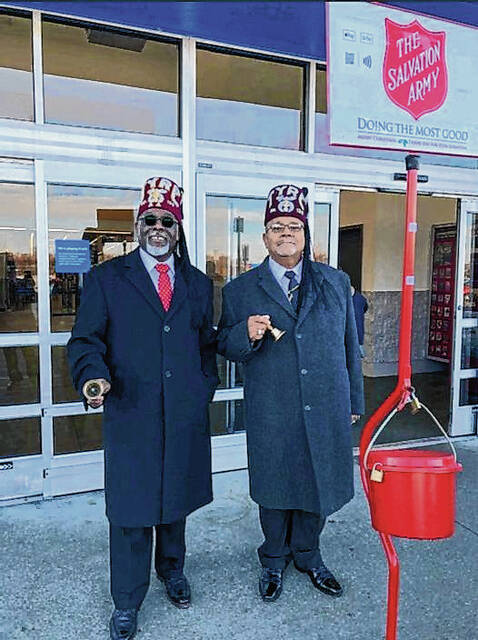
Members of the Bartholomew County Shriners help the Salvation Army’s Red Kettle Campaign. The campaign continues to raise funds through the end of January.
Photo provided
The Columbus Salvation Army is gradually advancing toward its overall Red Kettle Campaign goal of $135,000 by the end of the month.
Donations in the local kettles themselves ceased as usual on Dec. 24 at $71,689, according to Capt. Amy Tompkins, the local leader of the church and social service outreach. She had said just before Christmas that kettles were extremely far behind in donations and that she simply hoped to reach $70,000 by Dec. 24.
As of Wednesday, the campaign that has moved to mailed and online donations stood at $112,503, according to Tompkins. A few single $2,000 donations are part of that, and one $3,000 lump sum.
Money from the campaign goes to cover a wide variety of programs and needs.
That includes summer camps for youngsters. Youth activities for teens and others. Free meals for the struggling. A food pantry and utilities assistance to help residents make ends meet.
And more.
The campaign went into full swing Nov. 26, the earliest date that some larger stores allow the kettles out front. There were about 15 locations locally, according to Tompkins. Yet, in the past few years in Columbus and elsewhere throughout Indiana and other states, Salvation Army locales have struggled mightily to find enough volunteers — even paid volunteers — to fill time slots.
Also adding to financial challenges locally is the fact that the Columbus Salvation Army has never employed debit and credit card readers at the kettles as organizers in some other cities have done.
The social service agency’s annual budget, except for salaries and some other upfront expenses, comes out of the kettle campaign, according to leaders. Last year’s fundraising finished shy of the $135,000 goal, meaning that some youth programs this calendar year had to be trimmed slightly.
But Tompkins added that closures and adjustments during the pandemic last year meant that some programs had to be adjusted anyway.
She mentioned that the local campaign, along with others nationwide, have been impacted by unfounded rumors and misinformation online and elsewhere that the Salvation Army promotes critical race theory. People even dropped into the kettles notes that if the rumors were true, the note writers were no longer donating to the organization.
Critical race theory, also known by the acronym of CRT, proposes that any analysis of American society must take into account its history of racism and how race has shaped attitudes and institutions. It often overlaps with discussions of systemic racism — the ways policies, procedures and institutions work to perpetuate racial inequity.
The local office recently posted a video on its Facebook page at Columbus Salvation Army of Commissioner Kenneth Hodder, the organization’s national commander, firmly denying those accusations of advancing the theory. A few minutes into the clip, he cut to the bottom-line reality, apart from any societal or political beliefs.
“Right now, there are (still) lots of people who need our help,” Hodder said.




